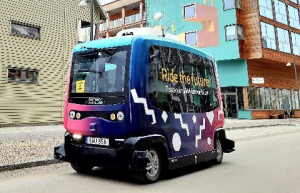Use Case A: Shuttle buses, Linköping, Sweden
Panacea project partner: VTI
Q1. Briefly describe the use-case in one or two sentences (site, vehicles, technologies tested etc):
The use case in Linköping has shuttle operators and their mangers in focus. The drivers are employed at Transdev Sweden AB and work 60% of their time on shuttles and the rest as city bus drivers or as tram drivers. Two shuttles of the brand Easy Mile will be equipped with a Datik system for inattention detection and at the office, a Sensair system for alcohol detection, a Leitat system for drug detection and the AIT stress sensor will be installed. A bio mathematical model (BMM) of fatigue will be used and aims to predict biological processes and human performance. By modelling the underlying driving forces of sleep (circadian rhythms, the homeostatic sleep drive, sleep fragmentation, etc.), it becomes possible to estimate and predict a driver’s fatigue level as it evolves over the course of a day.
Q2. What is the main objective of the use case?
The objective is to evaluate and assess the combination of sensors to detect alcohol, drugs, stress, and fatigue, and corresponding countermeasures, addressing both autonomous shuttle drivers and the managers.
Q3. What are the difficulties encountered in developing the use case?
How to make sure that all parts are integrated into one working system.
Q4. How will the collection of data/study be carried out?
The evaluation will be done at the test site that consists of a 4.1 km long route. It runs on roads with both mixed traffic, meaning interaction with other motorised vehicles, but also at a dedicated area with only pedestrians and cyclists allowed. The data collection will be conducted for an extended period of time in real-life operations of the shuttle service.
The data collection consists of three parts that takes place on different occasions. It will not be counterbalanced, since there is no way to guarantee that the shuttle drivers are not influenced by the system, especially the countermeasure part. The baseline data collection will take place approximately one month before the data collection with the system is activated. The data collection with the system activated will last for two months, where the first month will be used to tune the system and the second is seen as the month where evaluations will take place. During the evaluation phase the drivers will report, on a daily basis, how they experience the systems in terms of detections/countermeasure performance perspective.
Q5. How does the use-case contribute to the PANACEA project and to improved road safety more broadly?
Priority of the integrated detection/ countermeasure system, here called PANACEA, is hence on supporting the driver, off-duty (lifestyle, to ensure fitness prior to starting shift), on-duty (pre-driving, the driver is at work and should be assessed before they are allowed in the vehicle), and on-road (in the vehicle while driving as a guidance/assistance system).



